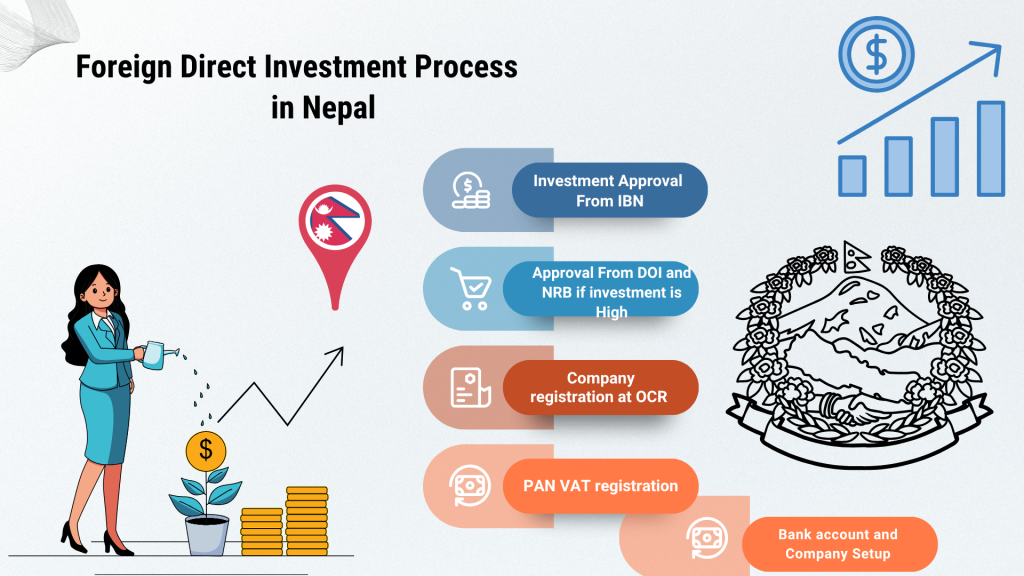Table of Contents
FDI in Nepal the Complete Guide to FDI Process in Nepal
FDI Process Nepal has undergone significant transformations in recent years, making it more accessible for foreign investors seeking opportunities in this emerging market. The FDI Process Nepal is governed by comprehensive legal frameworks designed to facilitate foreign investment while protecting national interests. Understanding the FDI Process Nepal is crucial for investors looking to capitalize on Nepal’s strategic location between India and China, as well as its abundant natural resources and growing consumer market.
What is FDI Process Nepal?
The FDI Process Nepal refers to the systematic procedure through which foreign individuals, companies, or organizations can invest in Nepalese businesses, industries, or projects. FDI Process Nepal encompasses various forms of investment including equity participation, reinvestment of earnings, loan investments, and technology transfer. The FDI Process Nepal is primarily regulated by the Foreign Investment and Technology Transfer Act (FITTA) 2019, which serves as the cornerstone legislation governing foreign investments in the country.
Legal Frameworks Governing FDI Process Nepal
The FDI Process Nepal is regulated by multiple legislative instruments that work together to create a comprehensive investment environment. Key legal frameworks include:
| Legal Framework | Year Enacted | Primary Purpose |
|---|---|---|
| Foreign Investment and Technology Transfer Act (FITTA) | 2019 | Primary legislation governing FDI Process Nepal |
| Foreign Investment and Technology Transfer Regulations | 2021 | Detailed implementation guidelines |
| Industrial Enterprises Act | 2020 | Industrial promotion and regulation |
| Companies Act | 2006 | Corporate governance and registration |
| Public Private Partnership and Investment Act | 2019 | Large-scale infrastructure investments |
| Income Tax Act | 2002 | Tax policies for foreign investments |
Recent Developments in FDI Process Nepal (2023-2025)
The FDI Process Nepal has been significantly streamlined through recent reforms. On October 2, 2023, the Government of Nepal introduced the automatic route for foreign investments up to NPR 500 million (~$37.6 million), representing a major breakthrough in the FDI Process Nepal. This reform has reduced bureaucratic hurdles and accelerated approval timelines for qualifying investments.
Additionally, the minimum capital requirement for the FDI Process Nepal was reduced by 60% to NPR 20 million (approximately USD 155,000), making Nepal more accessible to smaller foreign investors. These reforms demonstrate Nepal’s commitment to improving the FDI Process Nepal and attracting more foreign capital.
Governing Authorities in FDI Process Nepal
The FDI Process Nepal involves multiple regulatory authorities, each with specific responsibilities:
| Authority | Investment Threshold | Primary Role in FDI Process Nepal |
|---|---|---|
| Department of Industry (DOI) | Up to NPR 6 Billion | Primary approval authority for most investments |
| Investment Board Nepal (IBN) | Above NPR 6 Billion or Hydropower >200MW | Large-scale investment approvals |
| Nepal Rastra Bank (NRB) | All investments | Final approval for foreign currency transactions |
| Office of Company Registrar (OCR) | All investments | Company registration and compliance |
| Inland Revenue Department (IRD) | All investments | Tax registration and compliance |
Step-by-Step FDI Process Nepal

Step 1: Investment Approval Application
The FDI Process Nepal begins with submitting an application to either the Department of Industry (DOI) or Investment Board Nepal (IBN), depending on the investment size. For investments under NPR 500 million, the automatic route can be utilized, significantly expediting the FDI Process Nepal.
Step 2: Company Registration
Following investment approval, the next phase in the FDI Process Nepal involves registering the company at the Office of Company Registrar (OCR). This step requires submitting Memorandum of Association (MOA), Articles of Association (AOA), and investor details.
Step 3: Tax Registration
The FDI Process Nepal continues with obtaining a Permanent Account Number (PAN) and registering for VAT (if applicable) at the Inland Revenue Department (IRD).
Step 4: Nepal Rastra Bank Approval
A critical component of the FDI Process Nepal is obtaining approval from Nepal Rastra Bank (NRB) for foreign currency transactions and investment infusion.
Step 5: Business License and Sector-Specific Approvals
The final stage of the FDI Process Nepal involves obtaining necessary business licenses and sector-specific approvals before commencing operations.
Minimum Capital Requirements in FDI Process Nepal
The FDI Process Nepal requires a minimum investment of NPR 20 million (approximately USD 155,000) for most sectors. However, exceptions exist in the FDI Process Nepal:
- IT Companies: No minimum investment requirement
- Automatic Route: Investments up to NPR 500 million enjoy streamlined processing
- Hydropower Projects: Special considerations apply based on project scale
Sectors Open for FDI Process Nepal
The FDI Process Nepal welcomes foreign investment in most sectors, with particular emphasis on:
Priority Sectors in FDI Process Nepal
- Hydropower and Renewable Energy: Nepal’s vast hydroelectric potential
- Tourism and Hospitality: Hotels, resorts, and adventure tourism
- Information Technology: Software development and digital services
- Manufacturing and Industrial Production: Value-added industries
- Agriculture and Agro-based Industries: Modern farming and processing
- Banking, Finance and Insurance: Financial services sector
- Health and Medical Services: Hospitals and pharmaceuticals
- Infrastructure Development: Roads, airports, and urban development
Restricted Sectors in FDI Process Nepal
Certain sectors are restricted or prohibited in the FDI Process Nepal:
| Restricted Sector | Specific Restrictions in FDI Process Nepal |
|---|---|
| Primary Agriculture | Limited to technology transfer and mechanization |
| Cottage and Small Industries | Completely reserved for domestic investors |
| Personal Services | Hair cutting, tailoring, driving services |
| Arms and Ammunition | Complete prohibition |
| Real Estate Business | Excluding construction industries |
| Retail Business | Restricted for foreign investment |
| Mass Media | Newspapers, radio, television in national language |
| Professional Services | Legal, accounting, engineering consultancy |
| Tourism Services | Travel agencies, trekking, mountaineering guides |
Document Requirements for FDI Process Nepal
The FDI Process Nepal requires comprehensive documentation to ensure compliance and transparency:
Essential Documents for FDI Process Nepal
- Project Report: Detailed business plan with market, technical, and financial aspects
- Investor Profile: Company profile and bio-data of foreign investors
- Registration Documents: Certificate of incorporation, MOA, AOA
- Corporate Resolution: Board resolution approving investment in Nepal
- Financial Credibility: Bank certificate demonstrating financial capacity
- Source of Funds: Documentation proving legitimate source of investment
- Power of Attorney: Authorization for local representatives
- Passport Copies: Notarized copies of investor passports
- Commitment Letter: Agreement not to repatriate investment within one year
- Joint Venture Agreement: If applicable to the investment structure
Timeline for FDI Process Nepal
The FDI Process Nepal typically follows this timeline:
- Automatic Route Applications: 15-30 days
- Standard Route Applications: 1-2 months
- Large-scale Projects (IBN): 2-3 months
- Sector-specific Approvals: Additional 2-4 weeks
Technology Transfer in FDI Process Nepal
Technology transfer is a crucial component of the FDI Process Nepal, allowing foreign investors to bring advanced technologies, expertise, and management skills. The FDI Process Nepal encourages technology transfer through various incentives and simplified procedures.
Benefits of FDI Process Nepal
The FDI Process Nepal offers numerous advantages for foreign investors:
Key Benefits in FDI Process Nepal
- Tax Incentives: Corporate tax holidays and duty-free imports
- 100% Profit Repatriation: Full repatriation of profits and dividends
- Strategic Location: Access to Indian and Chinese markets
- Growing Consumer Market: Emerging middle class with increasing purchasing power
- Affordable Workforce: Skilled labor at competitive costs
- Government Support: Investment-friendly policies and reforms
- Natural Resources: Abundant water, mineral, and agricultural resources
Challenges in FDI Process Nepal
Despite improvements, the FDI Process Nepal still presents certain challenges:
Common Challenges in FDI Process Nepal
- Bureaucratic Procedures: Multiple approvals and documentation requirements
- Infrastructure Limitations: Power supply, transportation, and digital connectivity
- Policy Uncertainty: Frequent regulatory changes affecting investment climate
- Foreign Exchange Restrictions: NRB regulations on currency transactions
- Labor Relations: Union activities and labor law compliance
Success Stories in FDI Process Nepal
Several companies have successfully navigated the FDI Process Nepal and established thriving operations:
Notable Success Stories in FDI Process Nepal
- Hongshi Shivam Cement: Chinese investment in Nepal’s cement industry
- TELIASONERA: Successful foreign investment in telecommunications sector
- Various Hydropower Projects: International investments in renewable energy
- Tourism Infrastructure: Foreign investments in hotels and resorts
FAQ Section: FDI Process Nepal
What is the minimum capital requirement for FDI Process Nepal?
The minimum capital requirement for FDI Process Nepal is NPR 20 million (approximately USD 155,000) for most sectors. However, IT companies have no minimum investment requirement, and investments up to NPR 500 million can utilize the automatic route.
Where is FDI Process Nepal regulated?
The FDI Process Nepal is primarily regulated by the Department of Industry (DOI) for investments up to NPR 6 billion, Investment Board Nepal (IBN) for larger investments, and Nepal Rastra Bank (NRB) for foreign currency transactions.
What is the automatic route in FDI Process Nepal?
The automatic route in FDI Process Nepal, introduced in October 2023, allows for streamlined approval of foreign investments up to NPR 500 million (~$37.6 million) without requiring extensive bureaucratic approvals.
How long does FDI Process Nepal take?
The FDI Process Nepal typically takes 15-30 days for automatic route applications, 1-2 months for standard applications, and 2-3 months for large-scale projects requiring IBN approval.
Can profits be repatriated in FDI Process Nepal?
Yes, the FDI Process Nepal allows 100% repatriation of profits and dividends, subject to Nepal Rastra Bank approval and compliance with foreign exchange regulations.
What sectors are restricted in FDI Process Nepal?
Restricted sectors in FDI Process Nepal include primary agriculture, cottage industries, personal services, arms manufacturing, real estate (excluding construction), retail business, mass media, and professional services.
What documents are required for FDI Process Nepal?
The FDI Process Nepal requires project reports, investor profiles, registration documents, financial credibility certificates, source of funds documentation, power of attorney, passport copies, commitment letters, and joint venture agreements where applicable.
Conclusion: FDI Process Nepal
The FDI Process Nepal has evolved significantly in recent years, with the introduction of the automatic route and reduced minimum capital requirements making Nepal more attractive to foreign investors. While challenges remain, the FDI Process Nepal offers substantial opportunities in sectors like hydropower, tourism, IT, and manufacturing.
For investors seeking to navigate the FDI Process Nepal successfully, professional legal guidance is essential. The FDI Process Nepal requires careful attention to regulatory compliance, documentation, and strategic planning. With the right approach and understanding of the FDI Process Nepal, foreign investors can capitalize on Nepal’s emerging market potential and strategic location in South Asia.
Contact Corporate Biz Legal for expert guidance on navigating the FDI Process Nepal and ensuring compliance with all legal requirements while maximizing your investment potential in this growing market.




